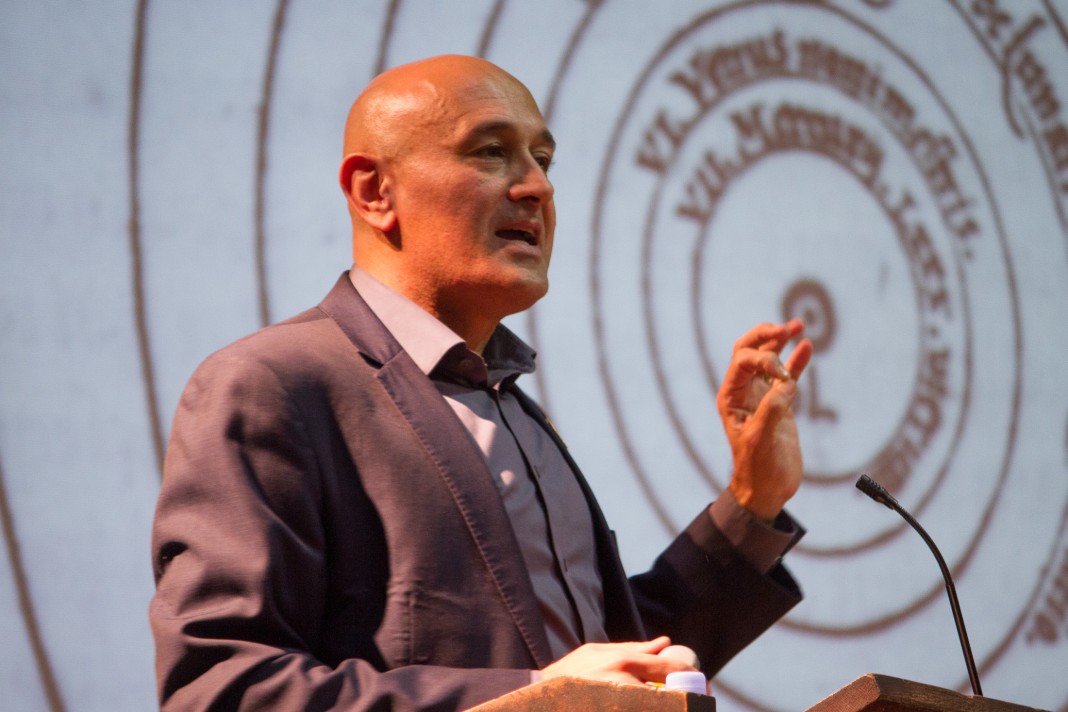The room was heaving in Conway Hall last night as British Humanist Association (BHA) President, physicist and broadcaster Professor Jim Al-Khalili gave this year’s Voltaire Lecture on the theme of ‘Lessons from the past: science and rationalism in medieval Islam.’ The lecture was chaired by his predecessor as President, and current BHA Vice President, the journalist Polly Toynbee.

Jim took his audience on a tour of the medieval world and told the story of a golden age of science written in Arabic, and of famous scientists such as Ibn al-Haytham, whom he declared stood alongside Archimedes and Sir Isaac Newton as one of history’s three greatest physicists.
Early Baghdad, and the Arab World at large, he explained, was a place of deep and rigorous learning at a time when Europe was in the Dark Ages. The contributions of its many scholars were well known then around Europe; but their legacies have not been well remembered in the West, or indeed in the Arab World.
Jim explained that in many cases, the West was later to rediscover many scientific developments first understood by scientists writing in Arabic, including the scientific method itself, which would be formulated once again by European Renaissance scholars some centuries later.
He also set out to look at why the Islamic world today produced so few scientists compared to the West, and which factors contributed to this, showing that Muslim countries have fewer than 10 scientists per 1000 of the population, compared to 140 out of 1000 for the developed world. He ended his lecture with a positive reflection on what appeared to be signs that the Arab World was shaking off its modern suspicions of science, and that scientists were once again beginning to flourish in the Middle East, albeit in isolated bubbles of academia.
In the Q&A session which followed, notable questions from the floor touched on whether limits placed upon the role of women has influenced the decline of science in Muslim countries, and how close scholars in the medieval Arab World came to approaching a theory of natural selection.
Notes
The British Humanist Association is the national charity working on behalf of non-religious people who seek to live ethical and fulfilling lives on the basis of reason and humanity. It promotes a secular state and equal treatment in law and policy of everyone, regardless of religion or belief.
About Jim Al-Khalili
Jim Al-Khalili is an Iraqi-born theoretical physicist, author and broadcaster. He is a professor at the University of Surrey where he teaches and carries out his research in quantum physics. He currently presents The Life Scientific on Radio 4 on Tuesday morning, where he interviews prominent scientists about their life and work. His 2010 book Pathfinders: The Golden Age of Arabic Science (published as The House of Wisdom in the United States) was the basis for this year’s Voltaire Lecture.
About the Voltaire Lecture
The Voltaire Lectures Fund was established by the legacy of Theodore Besterman, biographer of Voltaire, for lectures on ‘any aspect of scientific or philosophical thought or human activity as affected by or with particular reference to humanism.’ The British Humanist Association now oversees the fund. Previous Voltaire lecturers have included: Herman Bondi, Bernard Crick, Richard Dawkins, Antony Flew, Michael Foot, Robert Hinde, Ludovic Kennedy, Simon Blackburn, Robin Ince, Kenan Malik, Steven Pinker, Ray Tallis and Dick Taverne.
The event was live-tweeted by the BHA. See this link for a Storify of this year’s lecture: storify.com/BHAhumanists/voltaire-lecture-2014.
This year’s lecture was recorded and will be uploaded to youtube.com/britishhumanists soon.
